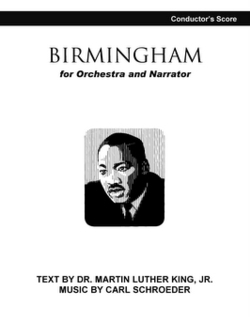|
|
|
|
about the composition
Birmingham (2006),
for orchestra and (optional) narrator, is dedicated to the work and memory of Civil Rights
Movement leader Dr. Martin Luther King, Jr. The work incorporates text from Dr.
King’s “Letter from Birmingham Jail,” written during his April 1963 civil
disobedience campaign in Birmingham, Alabama. |
|
Carl Schroeder of Minneapolis, Minnesota, composes music for concert band, orchestra, choir, chamber ensembles and solo piano that often draws inspiration from American history, current events, natural surroundings and memories. His large ensemble music has been performed by more than 40 concert bands, orchestras and choirs, including the Air Force Band of Mid-America, Minnesota Youth Symphonies and Chamber Choir Kyiv. He has written works on commissions from the Minnesota Symphonic Winds, Minnesota State Band, Cornell University Symphonic Band, Southwest Wind Ensemble, Calhoun-Isles Community Band, Wells Fargo Chorus and other ensembles and individuals. His music is featured on five CD recordings, his choral work Two December Carols is published by Boosey & Hawkes, and his concert band work Spin is published by C. Alan Publications. Schroeder is a 2005 graduate of St. Olaf College in Northfield, Minnesota, where he studied composition primarily with Timothy Mahr and Peter Hamlin. In 2001, he was named "Composer with Most Potential" by the Minnesota Music Educators Association, and in 2004 he was one of three under-25 American composers chosen to participate in the National Band Association’s Young Composer Mentor Project, where he took lessons with composers Mark Camphouse, Donald Grantham and Dana Wilson. He composed Birmingham during the spring of 2006, based on a piano score composed in January 2006. A piano version with music only, and no narration, is also available. - - - - - - - - - - - - - - - - - - - - - - - - - - - - - - - - - - - - - - - - - - - - - - - - - CONCERT PERFORMANCES
orchestra version unless otherwise noted RECORDINGS |
|
Instrumentation:
2 fl, 2 ob, 2 cl, 2 bsn, 4 hrn, 3 tpt, 3 tbn, tuba, timp, 2 perc, optional narrator,
strings |


 BIRMINGHAM
BIRMINGHAM